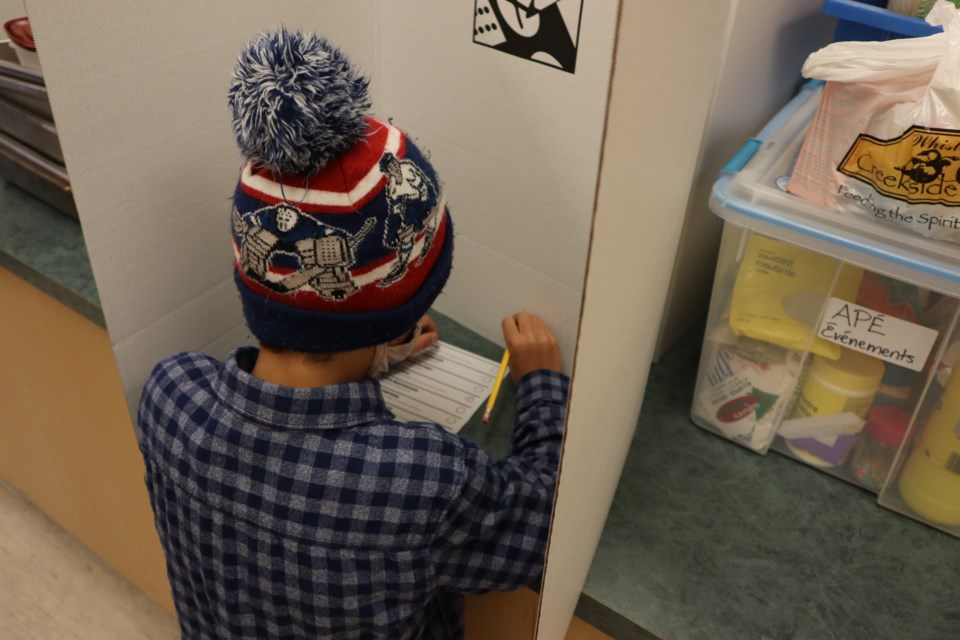If Grade 7 students at Spring Creek Community School in Whistler could elect the federal government, it would be a Green one.
With around 100 votes cast, the Spring Creek student’s polls had the Green Party winning with 32 votes. The NDP came in a close second with 31, followed by the Liberals with 18, Conservative’s with 11. The Rhino Party garnered three votes while the PPC and each independent candidate got one, with one ballot being rejected.
The class has spent the last couple weeks learning about the election process before holding their own student vote polling station on election day.
French Immersion teacher Jane Millen first brought the CIVIX-made program to the school about 6 years ago to get students involved and learning about politics in a fun and interactive way.
“I like politics and I like following it … I think it makes it special when you actually have the polling station. I tried to set it up to try and make it formal, and I think it makes it more real,” said Millen.
“As a teacher what I'm passionate about is raising responsible, healthy, happy engaged citizens and so this is part of being engaged. So I do think that as they get older they'll go on and some of them, hopefully all of them, will vote in the future as adults so that's pretty inspiring.”
In past years, Millen has even gone so far as to hold mock debates with students acting in place of the leaders, but with the quick turnaround of this year’s election, they didn’t have enough time for the extra stuff and had to stick to the basics of learning about the political parties and their platforms and running a student vote polling station in the school.
But despite only having a brief introduction to the voting process, the Grade 7 students were all excited to feel like they are a part of the election process.
“I think it's really cool that students get a chance to vote, even though it doesn't count for the actual votes. It still kind of just teaches them about the politics and it might inspire other people, other adults to vote or to think maybe I should vote too because every vote counts,” said student Cole Bonnell.
“It makes it feel like it's kind of important, it feels like we are almost adults. Even though we are still in Grade 7, it feels like we can get a voice.”
Overall, Millen said she wants to instil a habit of voting in her students but also for them to be engaged and informed on who the political leaders are and what their platforms offer—as well as to be able to rationalize to themselves who they end up voting for.
And from talking to a group of students who had volunteered to run the polling station, it seems Millen’s goal is coming to fruition as the students have noticed how their classmates’ opinions and process has changed since they last did a student vote in Grade 5.
“When we were in Grade 5 we did a student vote but a lot of people just thought the Green Party was all for the environment and they all voted that but then a lot of people, who I've been talking to now, they dove a little bit deeper and now they are voting a little bit different than they did back then,” said Mason Foose, who then gave an example of what platform policies stood out to him throughout the process.
“The NDP is going to raise taxes for billionaires and lower them for people with less money. I think that's cool because then the billionaires can help and the other people that maybe don’t have as much money don't have to get taxed as much so then maybe they can afford a car and house and that sort of stuff.”
According to Millen, when watching videos of each of the candidates, the students hated the question-dodging and constant attacks at other parties that has taken up huge chunks of time in pretty much every election process. But instead of losing interest in politics because of it, it has actually made many of them more excited for their chance to vote when they are old enough.
“I'm excited to vote because lots of people right now are just voting for one party because they are afraid of another party,” said Olivia Persson. “I'm excited to vote because I want to vote for who I think is the best and not because I'm afraid of another party."
Across the country, with more than 700,000 elementary and high-school students participating in CIVIX Canada’s student vote, the Liberal Party won the most seats with 117 but came in third in the popular vote with 24 per cent. The NDP won 107 seats but had 29 per cent of the popular vote. Meanwhile, the Conservative Party took home 91 seats and 25 percent of the popular vote while Bloc Quebecois won 20 seats and the Green Party won three




